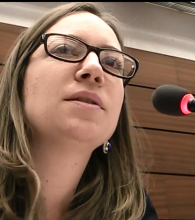100+ groups publicly call on United Nations to develop new binding instrument to address corporate human rights abuses
On the eve of the UN Forum on Business & Human Rights over one hundred civil society organisations and social movements have publicly joined the growing call for States to begin taking steps towards establishing a binding international treaty to deal with corporate human rights abuses.
The Joint Statement originated as an initiative of participants who attended the ESCR-Net Peoples' Forum on Human Rights & Business, between November 5-7, 2013.
Those who've signed the statement affirm "the applicability of human rights obligations to the operations of transnational corporations" and have called on States to "monitor and regulate the operations of business enterprises under their jurisdiction, including when acting outside their national territory". The obligation on States to do this is commonly referred to as States' extra-territorial obligations, or 'ETOs', as outlined in part by the Maastricht Principles on Extraterritorial Obligations of States in the area of Economic, Social and Cultural Rights.

This wide-ranging call for a binding treaty is distinct from other non-binding approaches currently being promoted at the international level. In particular, the call includes a requirement that States establish an "accountability mechanism", something detractors have readily pointed out is missing from the UN Guiding Principles on Business and Human Rights. Nevertheless, despite such differences in approach a treaty itself could be a natural accompaniment to the efforts underway to advance these Guiding Principles, rather than a distraction from the efforts to advance their implementation.
Signatories to this statement are a broad mix of civil society groups including both social movements as well as small and large NGOs from all regions of the world. These broad number of signatories call for action from the Human Rights Council in the form of the establishment of "an open ended working group tasked with a drafting mandate".
While the statement coincides with the beginning of the second annual UN Forum on Business & Human Rights this Tuesday, this call on the Human Rights Council to act will focus the attention of those in Geneva on the future of the UN's approach to corporate accountability, especially in light of the UN Working Group on Business and Human Rights reaching the end of their first mandate in mid-2014.
